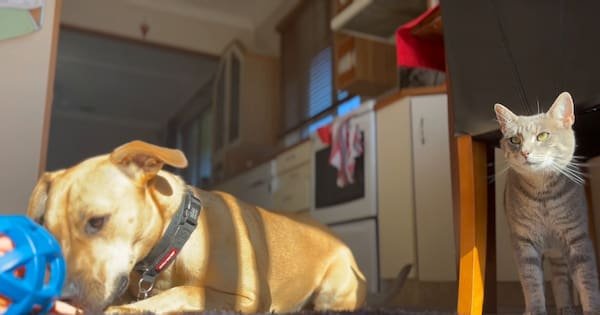A renters advocacy group argues the Government’s pet bond plan will result in more regulation for potential renters while leaving the power balance between landlords and tenants “untouched”.
The pet bond will change the Residential Tenancies Act to allow landlords to charge an additional bond of up to two weeks’ rent — on top of the standard bond which is up to four weeks’ rent — if a tenant wishes to have a pet in a property.
Housing Minister Chris Bishop said it will give tenants with pets greater choice when looking for rental properties.
But Renters United’s Luke Somervell told Breakfast a pet bond will not offer more security for renters and leaves the “fundamental balance between landlords and tenants untouched”.
“Landlords can still choose whether they want to take on people who offer pet bonds or not, it doesn’t guarantee a home.
“It’s moot anyway because landlords can just boot tenants out of their homes anyway because of no-cause evictions.”
He said if the Government wanted to make it easier for tenants who own pets to rent, they would ensure any tenant who will pay the pet bond should be accepted by the landlord.
“Ultimately the decision rests with the landlord who can decide whether they want to accept it depending on how they feel on the day.”
Sarina Gibbon from the Auckland Property Investors Association said there is a list of “reasonable grounds” in which a landlord could reject a prospective tenant.
“Things like if there is a body corporate law or council bylaw that prohibits the owning of a certain pet.”
Gibbon gave the example of a tenant breaching the Dog Controls Act 1996 as one of the reasonable grounds for rejection.
“So there are a list of grounds in there that we are looking forward to fleshing out in the select committee process so that it’s a bit more workable for both parties,” she said.
Somervell agreed that reasonable grounds can be provided, however he said many people don’t work through altercations with their landlords because it is “just too difficult” understanding the processes of the Tenancy Tribunal.
“That is, for most people, so intimidating that they just give up.”
Gibbon argued residential tenancy is a partnership, and said navigating legalities is “as difficult for landlords as it is for tenants”.
“We’re seeing Renters United putting on educational events for their tenants to get them to become more aware of the system and have it work in their favour.”
She said no matter how many weeks of bonds are proposed, the number is “always going to be too much”.
“We have an affordability issue in this country, and rent is too much in this country.
“I just think any mechanism we can put in place so that tenants with pets have equal access to the rental property so that this cohort isn’t confronted with higher rent prices because of that more restricted supply is a good thing.”
Nicola Willis responds
Finance Minister Nicola Willis, also the National Party’s deputy leader, was asked about the plan later on Breakfast.
Asked if the idea of a pet bond was simply performative given landlords can already claim for damage, Willlis’ answer was simple: “No.”
“This just responds to the reality that anyone who’s got a pet and has tried to get a rental property will have encountered, which is that many landlords are reluctant to take on people with pets because their perception is that that will lead to more damage to their property.
“This policy allows landlords in that situation to say, ‘Look, I want a special bond for the pet so that I know that if there is particular damage done, then I’ve got some recourse to make sure you pay for it.'”
The amendment bill was expected to be introduced to the House in May.

